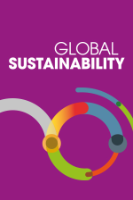Crossref Citations
This article has been cited by the following publications. This list is generated based on data provided by Crossref.
Troha, Tadej
2023.
Emergency Revisited.
Filozofski vestnik,
Vol. 43,
Issue. 2,
Trimmel, Katharina E.
Kriechbaum, Michael
Lazou, Rutger
and
Brudermann, Thomas
2024.
Between distributive and procedural justice claims: Reframing patterns of discursive resistance against climate action.
Energy Research & Social Science,
Vol. 109,
Issue. ,
p.
103424.
Harry, Steven J.
Maltby, Tomas
and
Szulecki, Kacper
2024.
Contesting just transitions: Climate delay and the contradictions of labour environmentalism.
Political Geography,
Vol. 112,
Issue. ,
p.
103114.



Lamb et al. (Reference Lamb, Mattioli, Levi, Roberts, Capstick, Creutzig, Minx, Müller-Hansen, Culhane and Steinberger2020) provide a very useful catalog of 12 ‘discourses of climate delay’ that accept the reality of anthropogenic climate change but are employed by a ‘counter-movement’ to justify delayed or inadequate action to mitigate it. The paper takes a great step forward in unmasking and understanding counterproductive framings of the climate change issue. I write here to identify some other discourses of delay, two of which are embedded in the paper.
One of these is the paper's claims that transformational change is needed in social, economic, and/or political systems to stabilize climate in an acceptable condition and that the push toward incremental solutions tends to crowd out possibilities for transformation. This can be a discourse of delay in that focusing only on transformational change may crowd out promising incremental efforts. Incremental changes have the relative advantage of greater feasibility, especially in the short run. And because of the long half-lives of greenhouse gases, reductions achieved quickly are more valuable than delayed ones. Whether incremental and transformational changes compete in a zero-sum fashion as the paper proposes is an empirical question. Some incremental changes may even facilitate transformation, as suggested by the transformational changes in energy systems that are starting to flow from incremental deployment of distributed solar energy systems.
Second, treating emissions target setting as a discourse of delay can itself be a discourse of delay. Verbal targets set by countries, cities, or companies are certainly insufficient on their own, but they can also provide serious steps forward, especially when stronger agreements are not yet feasible and when social movements, investors, insurers, competitors, and other change agents can provide checks against toothless commitments, thus pushing target setters to make progress they might not otherwise have made. Especially with international agreements, incremental steps may be the only possible beginnings (Keohane & Victor, Reference Keohane and Victor2016).
A third discourse of delay focuses on adapting to climate change. Adaptation, and especially anticipatory efforts at reducing vulnerability to foreseeable events, is critical. It is often more feasible to achieve than mitigation because the risks are typically local and readily visible. But an adaptation emphasis can delay mitigation efforts by suggesting the risks are reduced. Some of them are reduced in the short run, but delaying mitigation increases risks in the longer run and does not reduce climate-driven social stresses that can be imagined but not predicted (National Research Council, 2013). Also, as a matter of science policy, resources devoted to adaptation compete with mitigation efforts, which reduce the full range of climate risks, both expectable and unpredictable, for everyone.
In sum, advocates for combatting climate change should look in the mirror as well as out the window to spot discourses of delay.
Acknowledgements
The author acknowledges Michael P. Vandenbergh who provided comments on a draft.
Author contributions
PCS wrote the article.
Conflict of interest
PCS has collaborated with three of the coauthors of the Lamb et al. article: Roberts, Capstick, and Creutzig.